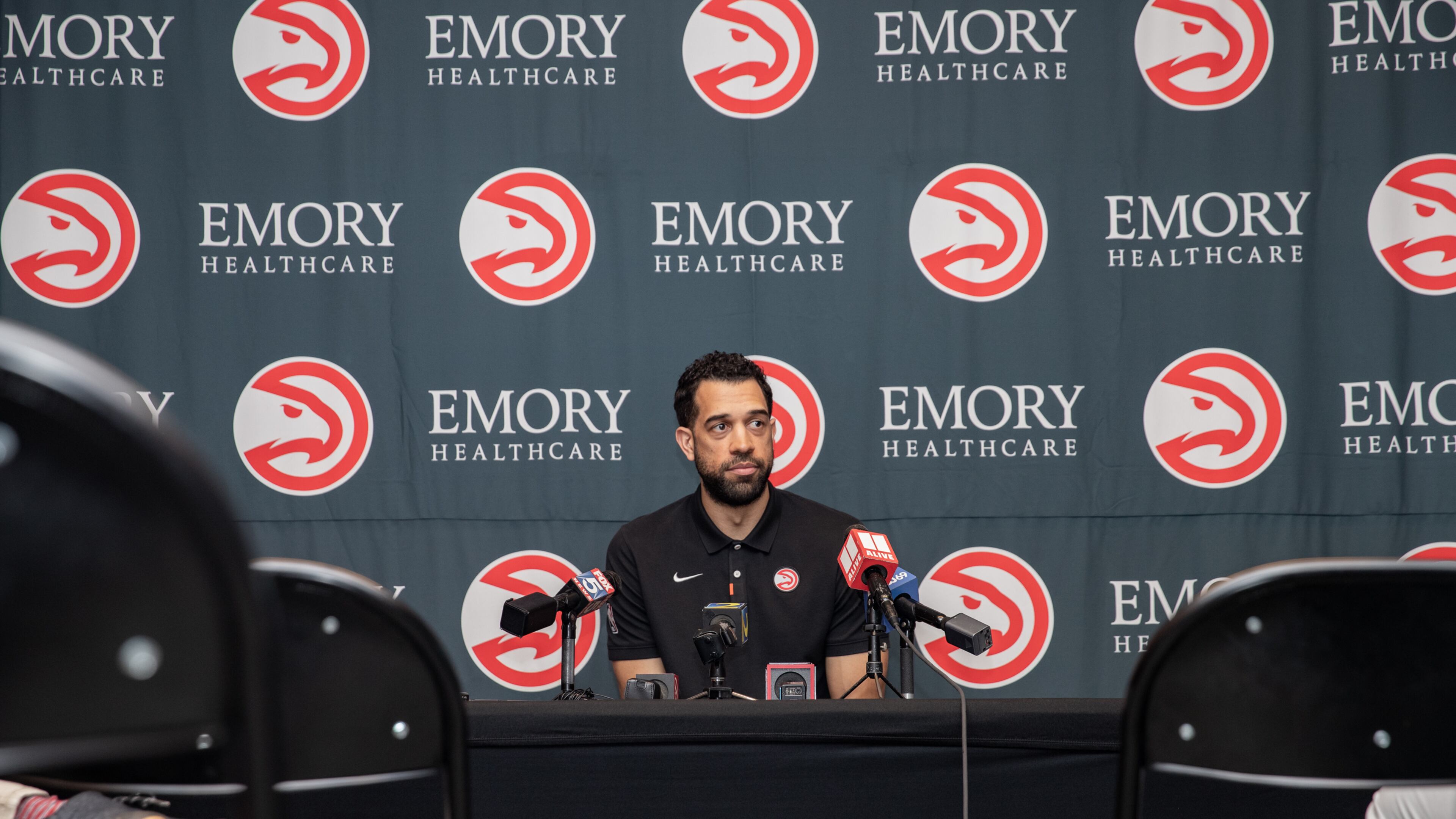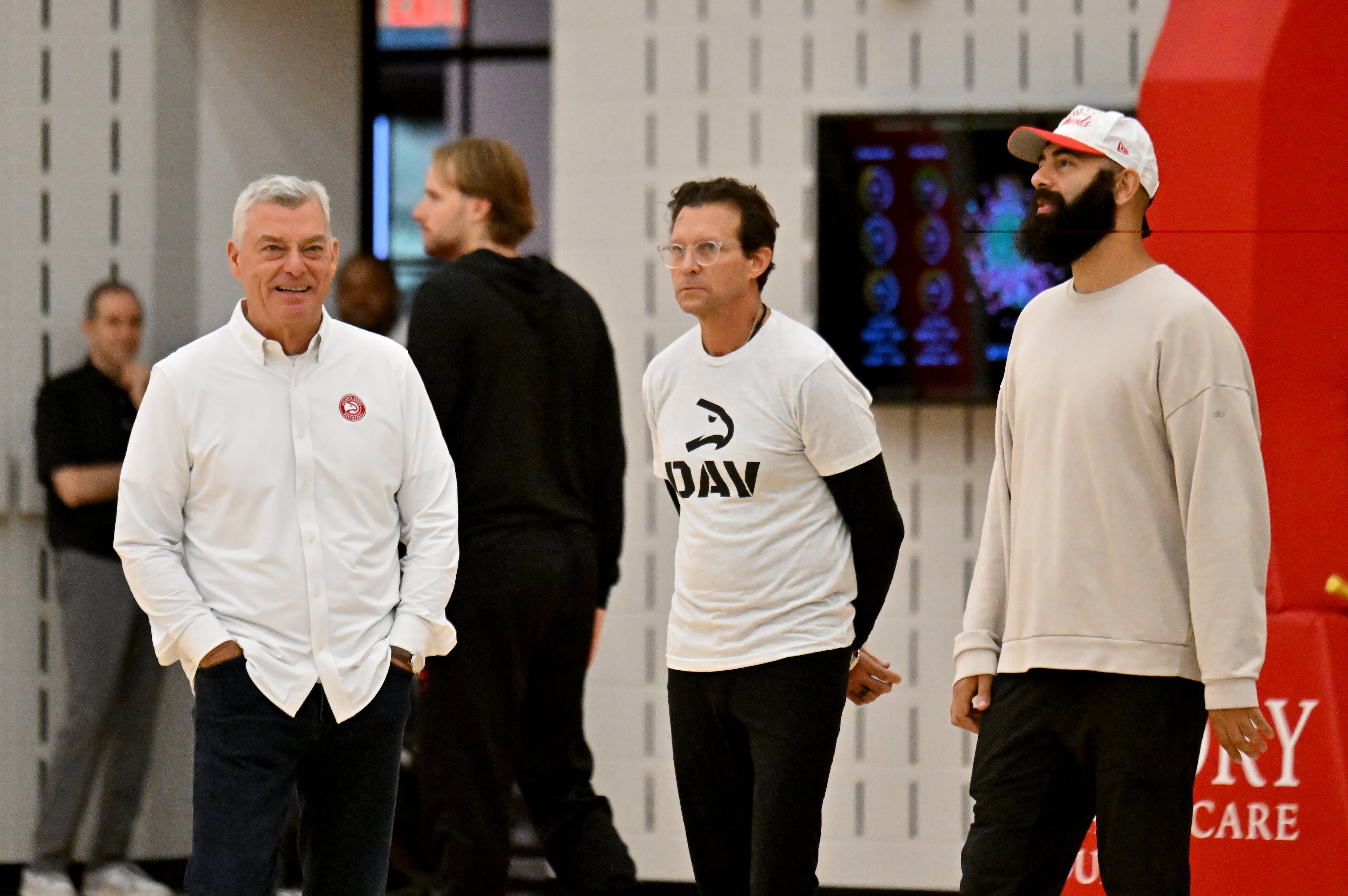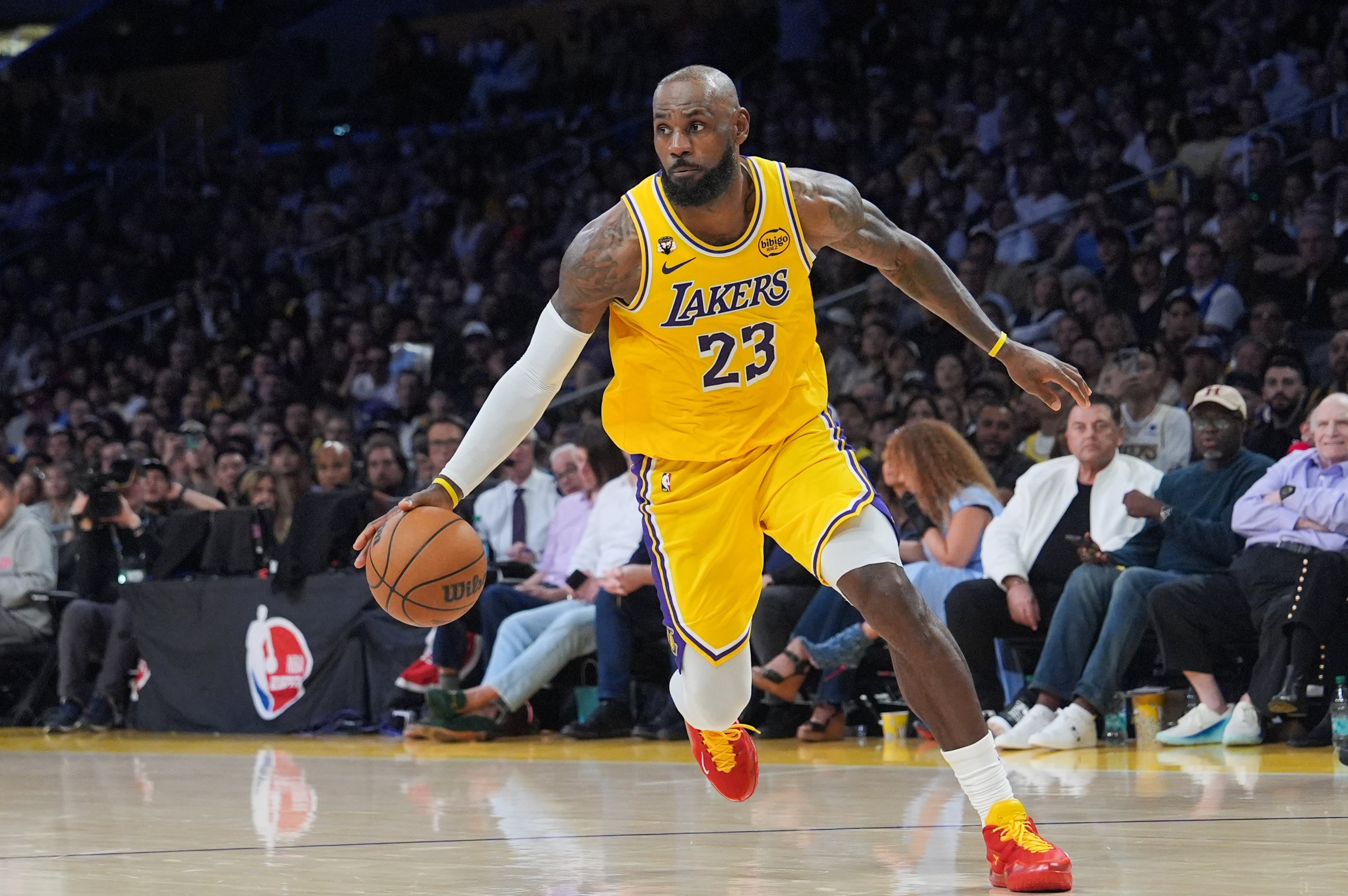Hawks’ Landry Fields Q&A: ‘We are a different team’

The Hawks held their end-of-season media availability Friday following their first-round exit from the playoffs. Hawks general manager Landry Fields addressed what the team accomplished after they pivoted to a new coach, as well as previewed what they will do during the offseason.
Here are some of Fields’ responses to questions asked at Friday’s media availability:
Opening statement: I want to start off, if you take a 30,000-foot view of this season from how we started to how we finished, the big transitions that we went through, the responses from our players and our coaching staff, to how we competed in this series – in the play-in with Miami to Boston – I just couldn’t be more proud of how they showed up, professional. They got better. We always talk about how do we become the best version of ourselves for whatever that means, in whatever landscape and the context that we’re in, I think we did that. And I think it gives a lot of hope for the future. And what it does is it really allows us to reflect on where we’ve been, and where we’re at right now. And I’m very proud of this group. We’re very proud.
Q: What does it mean for Hawks coach Quin Snyder to have such an imprint on these guys in such short amount of time?
A: I think (it) speaks volumes of Quin. I think it speaks to what we identified early in him and why we thought he was going to be the right coach for the job. And just watching him work day in and day out, the rapport he has with players, the level of respect, the level of detail that they all respect, the ability to engage and not just be in a supportive sense, but also when to challenge without guys shutting down. It’s very difficult to navigate in this league. And he’s done that. It’s been fun to see. Like it really makes it a good working environment and a real collaborative effort for all of us moving forward.
Q: Where do you start with your evaluations of this roster as you move into the offseason?
A: Yeah, well, we’re gonna get there. We really are. I mean, like, the craziest thing about sports is that just season abruptly ends, you know, not even 16 hours ago. And so I think sitting in that space, right, where beforehand, just looking at the way in which they showed up, and there was life and that series, and you know, you’ve given Boston stuff to think about, which is a very good team, you know, is where our focus is that it’s like, “OK, like, if that’s sort of the floor, where can the ceiling go?” And we’ll sit together as a front office and with Quin and the coaches and just figure out, “OK, this is what we need to do to take the next step.”
Q: How is life different for everybody and what changes when you kind of get a fresh start and go from the beginning of the season to the end and with continuity?
A: I really think it’s going to be very beneficial for us. And being able to go into the summertime, and start to really inject more and more of what’s already been placed before us with Quin, the new system, and a new set of standards and new absolutes, just from a cultural standpoint, has been good early. But then now going into next season, where that sort of set is going to be really beneficial. So guys walk in, knowing “OK, this is what we’re about. We’ve cut out some of the things that we needed to cut out. So now we can really direct our eyes on where we need to get to this next season.” So I anticipate all the guys will come back ready and willing to take the next step because we will define what that road’s gonna look like.
Q: How do you balance not necessarily looking at just this series in a vacuum with how well the team played and went toe to toe with Boston versus your larger vision for the season from Quin’s 20-30 games? How do you kind of balance that as you go into the offseason?
A: Well, it was good to have a reference point before Quin came and seeing kind of where we were at, and understanding that there’s still components of that, that you do have to take into account. You do have to balance that out. But then you also see the progression that guys make, and you’re somewhere in between at that point. But it’s been very hopeful. That’s where I don’t want to sit up here and say, “We’ve arrived.” But I also know we’re not where we were, regardless of the record. Like, we are a different team. You could see it in the guys faces. You can see it in how they approach practices day in and day out. The intentionality behind Quin and the system, the culture that he’s cultivating more and more of, it’s very exciting. But you still have to understand that we haven’t arrived (and) we got plenty of places to go. But we do want to celebrate how far we’ve come.
Q: John (Collins) is a name that consistently comes up in (trade) rumors? I mean, what is your vision for him? And how do you see him potentially fitting on this roster moving forward?
A: I think it’s the same that I’ve spoken about in the past – John’s name, it comes up a lot. He’s a good player. It should. A lot of teams value him, and we have a lot of value in him. We’re just not quite there yet on how we’re going to piece all of this together. We do have to take some time to celebrate, but then also to look back and figure out, “OK, what are the next steps like? What is the pathway with a particular group for a particular system that we’re implementing for us to take the next step.” We need to take time to reflect on that as a group.
Q: Do you have a plan or a feeling for what you want in Summer League and, or maybe which roster players you want to see in that environment?
A: Yeah, I mean, some of our younger guys, I think are obvious to play. And when we take time, we’re going to lay out development pathways for every single player. It’s gonna be customized to who they are as players and how we want them to fit into this system. And then Summer League is just going to be a great feedback loop for them to go, try to practice it more and more in like real-life game situations. And it gives us that proper mirror to see like, “OK, like, this is how they’re progressing,” and then go from there. But yeah, I’d imagine all of our young guys, and we’ve spoken with a few of them about it already. But that’s also a team that we’re gonna have to strategically place together because there’s a lot of stuff we want to accomplish in Summer League this year.
Q: Dejounte (Murray) is coming up on a contract year, how do you have those conversations with him and his agent, his team about getting him what he feels he deserves?
A: Well, just in the question, he’s not the type that comes to say, “Oh, I deserve this, that and the third.” It’s a day-by-day thing, but it’s also we haven’t even had those those talks. Like those will come in time as the season progresses and as we look at this, this roster and how it’s shaping up and whatnot. But it’s just not an area that we’ve touched on yet. And I’m sure we’ll get there. We’ll get there.
Q: How do you see Trae and (Murray’s) relationship or even just their dynamic on the court, and all throughout the season to where it was in the series against Boston?
A: I was on record by saying at first, it’s to be expected that it might look a little clunky. You’re asking two primary ballhandlers to now share a backcourt with each other, but two very talented playmaking ballhandlers. And it’s had its ups. It’s had its downs, to be honest. I think that we’ve all seen that where it looks a little clunky. But there’s also times where it’s been beautiful to watch. They play for each other. They play within the game flow. And you just see how talented they are as a group where it’s like, “Well, if that guy’s not doing it tonight, that other guy sure is,” and it becomes a nightmare for the defense. And so, it’s still working in a complementary sense. But I think we got a great taste of it in the last month here. I think Quin has been able to figure out a great way for those two to coexist in a way that is going to enhance our group, but Trae Young and Dejounte Murray is your backcourt. That’s a fun backcourt.



